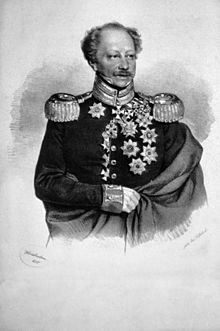Friedrich Karl von Tettenborn

Friedrich Karl Freiherr von Tettenborn (born February 19, 1778 in the then Baden part of the County of Sponheim ; † December 9, 1845 in Vienna ) was a cavalry general in the Wars of Liberation and a Baden politician .
biography
Tettenborn was born the son of a margravial hunter from Baden. He first studied forest science in Waltershausen and then at the Universities of Göttingen and Jena . In 1794 he joined the Kinsky-Chevauxlegers Regiment No. 5 of the Austrian Army as a cadet and was quickly promoted to Rittmeister during the French Revolutionary Wars . In the Austro-French War in 1805 he was in the army under Mack , but before the surrender of Ulm he got by with Archduke Ferdinand and General Schwarzenberg . In the battle of Wagram (1809) he acquired the rank of major . After the Peace of Vienna he accompanied Prince Schwarzenberg to Paris. When the Russian War broke out in 1812, he joined the Russian army as a lieutenant colonel .
At the head of Kutuzov's vanguard he first moved back into Moscow , followed the French as far as the Beresina at the head of the light cavalry , then took Vilna , crossed the Memel , pushed MacDonald back through East Prussia and occupied Konigsberg .
Appointed colonel , he then crossed the Vistula and Oder and, after having united with General Tschernyschow in Landsberg, advanced into Berlin . From there he was sent to Hamburg , which he occupied on March 18, 1813, after he had thrown Morand back on the left bank of the Elbe near Bergedorf . But on May 30th he had to leave the city to the advancing Davout . His work in Hamburg is viewed critically. “He saw Hamburg as a favorable location to enrich yourself and lead a dissolute lifestyle. He tried less to seriously defend the city than to collect an 'honorary gift' from 5000 Friedrich d'or and his appointment as an honorary citizen. "
Then Tettenborn fought under Ludwig von Wallmoden-Gimborn against Louis-Nicolas Davout and against Marc Nicolas Louis Pécheux . After his defeat, he moved into Bremen on October 15 as a Russian major general with his cavalry , but soon had to give way again. On November 4, 1813, he reached Bremen again. He worked with some Bremen residents and initiated the first pacification measures by setting up a provisional government commission consisting of seven senators. As early as November 6, 1813, the Bremen Council was reconstituted and reintroduced the old Bremen city law .
Tettenborn was then in the vicinity of the Swedish Crown Prince Karl , the former Marshal of France Jean-Baptiste Bernadotte and he moved with his troops to Jutland .
In January 1814 he was commissioned to establish the connection between the individual armies of the Allies with a corps of light cavalry in France .
After the peace he withdrew to his estates, and in 1818 he transferred from the Russian to Baden services as an authorized minister. Here he put the territorial differences between Baden and Bavaria in order, was active when the constitution was established and in 1819 went to Vienna as the Baden ambassador , where he also died.
Honors
- House Order of Loyalty (1834)
- Commander of the Military Karl Friedrich Order of Merit (1815)
- Grand Cross of the Order of the Zähringer Lion (1834)
- Order of the Iron Crown 1st class
- Knight's Cross of the Military Maria Theresa Order
- Knight's Cross of the Austrian Imperial Leopold Order
- Russian Order of Saint Anne I. Class
- Order of St. Vladimir II class
- Russian Order of Saint George III. Class with a golden saber of honor and diamonds
- Order of the Red Eagle II class
- Knight of the Legion of Honor
- Order of the sword II class
- Knight of the Hessian House Order of the Golden Lion November 30, 1814
- Grand Cross of the Grand Ducal Hessian Order of Ludwig
- Knight of the Military Max Joseph Order (1815)
literature
- Peter Broucek : Tettenborn, Friedrich Karl Frh. Von. In: Austrian Biographical Lexicon 1815–1950 (ÖBL). Volume 14, Verlag der Österreichischen Akademie der Wissenschaften, Vienna 2012–, ISBN 978-3-7001-7312-0 , p. 265 f. (Direct links on p. 265 , p. 266 ).
- Bernhard von Poten : Tettenborn, Karl Freiherr von . In: Allgemeine Deutsche Biographie (ADB). Volume 37, Duncker & Humblot, Leipzig 1894, pp. 596-605.
- Karl August Varnhagen von Ense : History of the military campaigns of General Tettenborn. Stuttgart 1814.
- Jaromir Hirtenfeld : The military Maria Theresa order and its members. Vienna 1857, pp. 776-779.
- Working group on home and history group Tettenborn: Chronicle of the village of Tettenborn. Headquarters of the barons of Tettenborn. 2009, ISBN 978-3-86805-450-7 .
Individual evidence
- ↑ Andreas Fahl: The Hamburg Citizens' Military 1814–1868. Berlin 1987, p. 24f with further references.
- ^ Herbert Black Forest : The Great Bremen Lexicon . 2nd, updated, revised and expanded edition. Edition Temmen, Bremen 2003, ISBN 3-86108-693-X , p. 881.
- ↑ Awards and their order, unless otherwise stated, according to Hof- und Staats-Handbuch des Großherzogthums Baden: 1845 , p. 107
- ^ Kur-Hessischer Staats- und Adress-Calender (1817) p. 18.
- ^ Rudolf von Kramer, Otto Freiherr von Waldenfels: VIRTUTI PRO PATRIA. The Royal Bavarian Military Max Joseph Order of War Deeds and Book of Honor 1914-1918. Self-published by the Royal Bavarian Military Max Joseph Order, Munich 1966, p. 443.
| personal data | |
|---|---|
| SURNAME | Tettenborn, Friedrich Karl von |
| ALTERNATIVE NAMES | Tettenborn, Friedrich Karl Freiherr von |
| BRIEF DESCRIPTION | Austrian general of the cavalry in the war of freedom |
| DATE OF BIRTH | February 19, 1778 |
| PLACE OF BIRTH | County of Sponheim |
| DATE OF DEATH | December 9, 1845 |
| Place of death | Vienna |